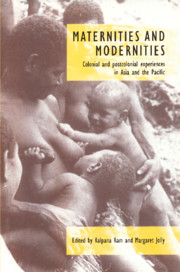Book contents
- Frontmatter
- Contents
- List of illustrations
- Notes on contributor
- Acknowledgements
- Map 1 Location of countries and regions in Asia and the Pacific discussed in this volume
- Introduction Colonial and postcolonial plots in histories of maternities and modernities
- 1 Shaping reproduction: maternity in early twentieth-century Malaya
- 2 Modernizing the Malay mother
- 3 ‘Good wives and mothers’ or ‘dedicated workers’? Contradictions of domesticity in the ‘mission of sisterhood’, Travancore, south India
- 4 Maternity and the story of enlightenment in the colonies: Tamil coastal women, south India
- 5 The dai and the doctor: discourses on women's reproductive health in rural Bangladesh
- 6 Other mothers: maternal ‘insouciance’ and the depopulation debate in Fiji and Vanuatu, 1890–1930
- 7 Just add water: remaking women through childbirth, Anganen, Southern Highlands, Papua New Guinea
- 8 From sisters to wives: changing contexts of maternity on Simbo, Western Solomon Islands
- Epilogue Maternal experience and feminist body politics: Asian and Pacific perspectives
- Index
3 - ‘Good wives and mothers’ or ‘dedicated workers’? Contradictions of domesticity in the ‘mission of sisterhood’, Travancore, south India
Published online by Cambridge University Press: 06 July 2010
- Frontmatter
- Contents
- List of illustrations
- Notes on contributor
- Acknowledgements
- Map 1 Location of countries and regions in Asia and the Pacific discussed in this volume
- Introduction Colonial and postcolonial plots in histories of maternities and modernities
- 1 Shaping reproduction: maternity in early twentieth-century Malaya
- 2 Modernizing the Malay mother
- 3 ‘Good wives and mothers’ or ‘dedicated workers’? Contradictions of domesticity in the ‘mission of sisterhood’, Travancore, south India
- 4 Maternity and the story of enlightenment in the colonies: Tamil coastal women, south India
- 5 The dai and the doctor: discourses on women's reproductive health in rural Bangladesh
- 6 Other mothers: maternal ‘insouciance’ and the depopulation debate in Fiji and Vanuatu, 1890–1930
- 7 Just add water: remaking women through childbirth, Anganen, Southern Highlands, Papua New Guinea
- 8 From sisters to wives: changing contexts of maternity on Simbo, Western Solomon Islands
- Epilogue Maternal experience and feminist body politics: Asian and Pacific perspectives
- Index
Summary
Recent feminist reassessments of the historiography of European colonialism have identified a gendered quality intrinsic to colonizing endeavours across a range of imperial settings (see for example Callaway 1987; Chaudhuri and Strobel 1992; Grimshaw 1989; Hunter 1984; Jolly and Macintyre 1989; Knapman 1986; Strobel 1991). In particular, these studies have revealed a cultural agenda directed at transforming the ideologies and practices of indigenous gender orders into versions of metropolitan norms. This gendered dimension of colonialism is embodied, in much of this literature, in those ‘colonizing women’ who not only provided potent symbolic images for the ‘recasting’ of indigenous women, but were significant agents in articulating and conducting a project of domestication aimed at colonized women. Through the influence of their own exemplary femininity and domesticity, white women sought to remodel indigenous women into the ‘good wives and mothers’ they themselves were assumed to personify. Missionary women, as wives and single women, are prominent in this revisionist history, reflecting the intimate connections between nineteenth-century evangelical Christianity, dominant gender ideologies and imperialism.
Interestingly, given Britain's imperial and evangelical past, it is the North American women's missionary movement which has attracted most research attention to date. In particular, the book-length studies by Jane Hunter (1984) and Patricia Grimshaw (1989) and a growing periodical literature have begun to document missionary women's involvements in proselytizing a ‘gospel of gentility’, to use Hunter's term, in an overt programme to ‘convert’ indigenous women not only to Christianity but to conventions of ‘true womanhood’ embodied in the exemplary figure of the missionary women themselves (see especially Flemming 1992; Grim- shaw 1989; Hunt 1990a, 1990b; Hunter 1984; Jolly 1991; Ramusack 1992).
- Type
- Chapter
- Information
- Maternities and ModernitiesColonial and Postcolonial Experiences in Asia and the Pacific, pp. 81 - 113Publisher: Cambridge University PressPrint publication year: 1998
- 10
- Cited by



